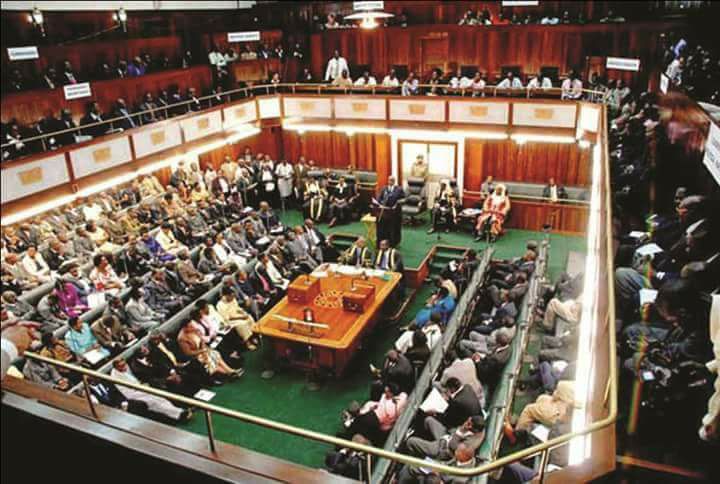The Deputy Attorney General, Mwesigwa Rukutana has Thursday at 4:07pm. presented before Uganda’s Parliament the Constitution Amendment Bill 2017, that critics say is disguised as about compulsory land acquisition.
Fierce debate has ensued about the bill’s intentions since news broke the story of its gazetting.
The first reading of the Constitution (Amendment) Bill 2017, which carries, among other clauses, a proposal to remove the upper age-limit for presidential candidates was made by Rukutana who represented the Minister of Justice and Constitutional Affairs, Kahinda Otafire.
Noise ensued in the House but Speaker Rebecca Kadaga, managed to calm down members of the opposition and leftist NRM legislators as they tried to disrupt Rukutana with the government seen as using the bill to amend Article 102b of the constitution, to lift the age limit.
Kadaga later referred the Bill to the committee of Legal Affairs to study and guide the house.
President Yoweri Museveni, who turns 73 later this year, will be 76 by 2021 and thus ineligible to stand for president under the constitution as it is today. Political analysts predict that just as he did in the run-up to the lifting of presidential term limits in 2005, President Museveni will distance himself from the move to remove the age-limit, leaving it to his outspoken supporters in and out of the NRM-dominated parliament.
A copy of the Constitution Amendment Bill 2017 tabled by Deputy Attorney General Mwesigwa Rukutana this afternoon @observerug pic.twitter.com/qVsmrkHYDa
— Eyotaru Olive Yemima (@eyotaruolive) July 13, 2017
In September 2016, Robert Kafeero Ssekitooleko the Nakifuma MP tried in vain to table a private member’s bill that was seen as a ruse to lift the presidential age limit in the Constitution.
Thursday evening’s move by government of tabled on the floor of Parliament the Bill to amend to the Constitution could be a turning point in Uganda’s history.
What we know so far
The official object of the Bill Rukutana presented today is to amend article 26 of the Constitution in accordance with Articles 259 and 262 of the Constitution.
Parliament Watch explained that the purpose of the Bill is to resolve the current problem of delayed implementation of Government infrastructure and investment projects due to disputes arising out of the compulsory land acquisition process.
The problem of delayed Government projects has caused significant financial loss to the Government amounting to millions of dollars in penalties paid to road contractors for redundant machinery at construction or project sites as the courts attempt to resolve the disputes, most of which relate to the quantum of compensation.











